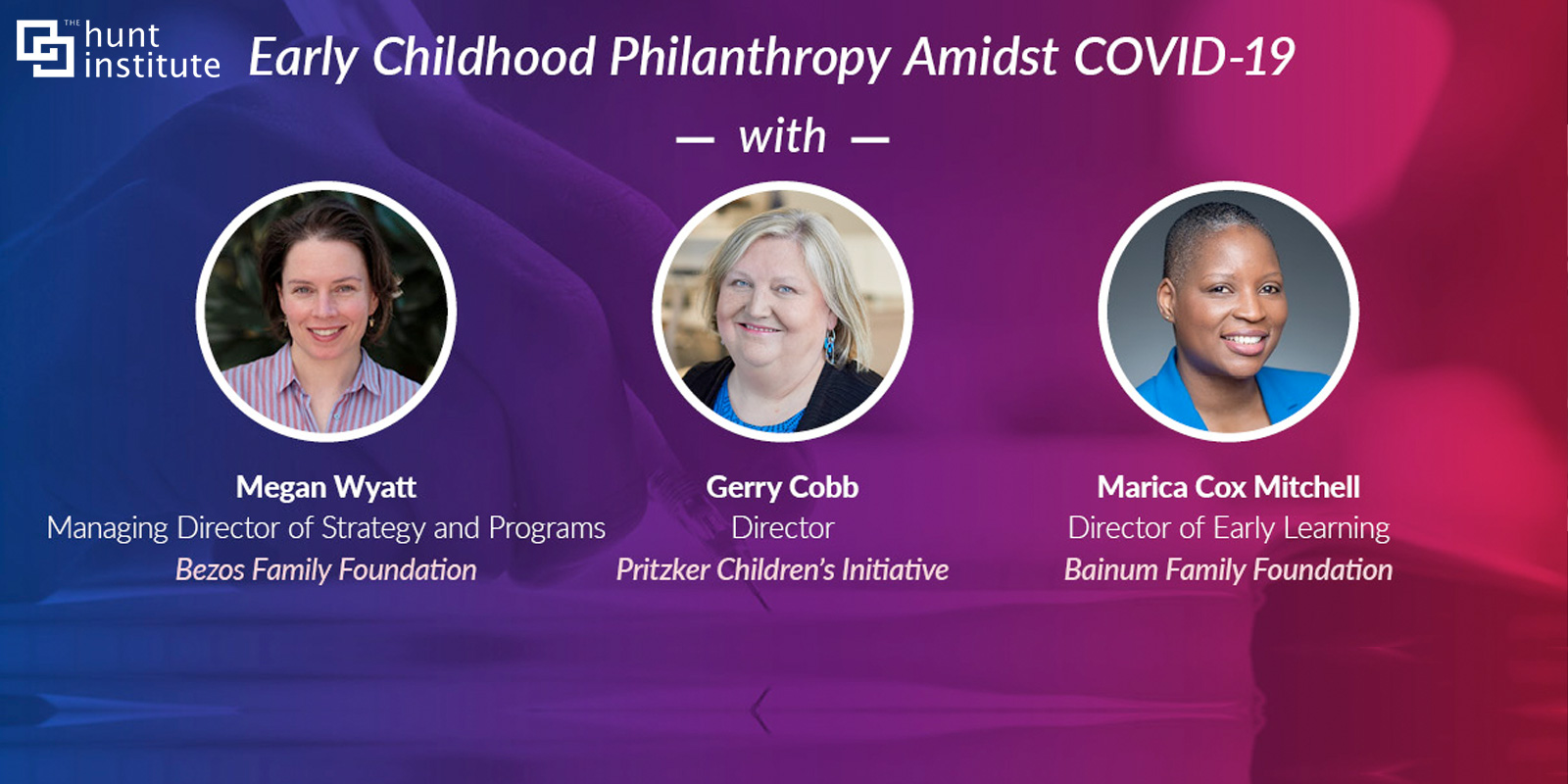Because we can’t take our Early Learning Nation Studio on the road during this time, stay tuned as ELN recaps Top Takeaways from important webinars, chats and virtual events from the Early Learning field. Join the conversation! And visit our Early Learning Nation channel on YouTube for interviews with leaders from education, child development, business, politics and more.
On Tuesday, June 16, The Hunt Institute hosted leaders in early childhood philanthropy for a discussion on initiatives and challenges in light of COVID-19 and the renewed focus on racial equity. Dr. Dan Wuori, Director of Early Learning, moderated the panel featuring the following philanthropic partners:
- Megan Wyatt, Managing Director, Programs and Strategy, Bezos Family Foundation (which also sponsors Early Learning Nation)
- Gerry Cobb, Director, Pritzker Children’s Initiative
- Marica Cox Mitchell, Early Learning Director, Bainum Family Foundation
All respondents were clear that their respective missions have not shifted. Instead, each organization has pivoted its approach in response to the needs of their constituents. They expressed the importance of using this transformative time as a learning opportunity and are working to gather insights on which changes have worked well, which haven’t and how they can use these insights to inform future initiatives. Visit this link to view a complete recording of the conversation.
Below you will find 3 summarized highlights from the Q&A.
Dan Wuori: Megan, recent closures, limited classroom capacity with reopening and decreased budgets are all impacting pre-K and early childhood care. Are there solutions to preserve access in a way that is equitable?
Megan Wyatt: This is a time of major disruption. We have to be optimistic and focused on building the system back better. We need more and better data about the needs and gaps in the market. The burden has been on the early childhood sector, and we all see now that it is the backbone of the economy, but the solutions require investments from other sectors as well.
We’ve learned that mobilizing locally is important as well as incorporating a strong social justice component, with parents and other stakeholders involved. Small business providers are at risk so policy and system levers are also important. We are learning a lot but are not quite at solutions yet.
Dan Wuori: Gerry, you are laser focused on prenatal to three. In conversations with your partners, what are unique challenges for families with children in this age group? Are there innovations you would point to as successes during this unusual time?
Dan Wuori: Marica, you’re an authority on the early childcare workforce, being in the nation’s capital and monitoring it nationally. How are things on that front?
Marica Cox Mitchell: There is a recognition that early childcare providers are essential and hold speciality knowledge. Black and brown providers are often excluded from the conversations and resource distribution. Centers and home providers are also needed at the table to drive recommendations with reopening. It is clear that each sector needs its own strategy, but as far as the workforce there are some things that are non-negotiable for returning.
Compensation, recruitment and retention will be important, especially since some providers started receiving unemployment. If that payment is higher than salary, that will be a hindrance for returning. In addition, the mental well-being and safety of providers are front of mind. Especially the aging population of the workforce has brought out concerns on whether it is healthy to return. If places are opening the way they were before, people may not return.
When discussing opportunities for future funding, Mitchell highlighted the need for flexible dollars, allowing grantees to use the funds to address their greatest need. Wyatt shared a similar view, saying that they have expanded grant making recognizing that this is a time of economic uncertainty for all. Each organization is still focused on making the early childhood education landscape more just and equitable for children, families and providers.

Mark Swartz
Mark Swartz writes about efforts to improve early care and education as well as developments in the U.S. care economy. He lives in Maryland.



